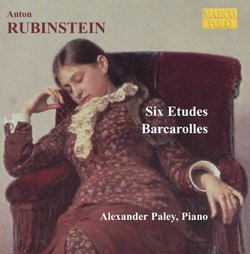| All Artists: Anton Rubinstein Title: Piano Works: Six Etudes / Barcarolles Members Wishing: 0 Total Copies: 0 Label: Marco Polo Original Release Date: 1/1/2002 Re-Release Date: 10/22/2002 Genre: Classical Styles: Chamber Music, Historical Periods, Classical (c.1770-1830) Number of Discs: 1 SwapaCD Credits: 1 UPC: 730099389426 |
Search - Anton Rubinstein :: Piano Works: Six Etudes / Barcarolles
 | Anton Rubinstein Piano Works: Six Etudes / Barcarolles Genre: Classical
|
Larger Image |
CD Details |
CD Reviews4.5 Stars - Anton the Great Hexameron | 06/17/2007 (5 out of 5 stars) "Anton Rubinstein was and is still a titanic legendary force. Almost everyone agreed he was the greatest pianist after Liszt. Yet he was also hailed in his time as a formidable composer. His "Melody in F" was probably played more than Beethoven's "Fur Elise." His "Ocean" Symphony was a favorite in Russia, and his Piano Concerto No. 4 used to be in the standard repertoire. It's sad and even irksome that his compositions linger in the shadows today. A few recordings of his piano concerti and symphonies can be found, but the neglect of his solo piano music is inexcusable. Leslie Howard's two Hyperion label releases are cherished treasures that prove Rubinstein's worth as a piano composer. It's good to see Alexander Paley and the Marco Polo label shedding some light on other Rubinstein piano works. Admittedly, these are lighter fare than the Sonatas, but they still swell with substantial music content.
"His remarkable inner force overflowed the confines of its banks... When Rubinstein was playing, it was like a volcano eruption..." says Saint-Saens. Certainly Rubinstein was a heaven-storming performer at the piano and his Six Etudes Op. 23 illustrates this well enough. The First Etude in F major is a gorgeous "study in the art of lucid arpeggiation." The influence of Liszt seems likely at first, but I find stronger hints of Thalberg, with the lush arpeggios and decorative passages. The Second Etude, known as the "Staccato" is a rapid tour-de-force that sounds easier than it really is; Earl Wild enjoyed playing this in his concerts. The Third Etude in C sharp minor is a long (8 minute) work of deep melancholy and profound exploration. The Fourth Etude is a flood of constant virtuosic decorations. Despite its endless and unoriginal use of arpeggios, the brilliance and fireworks of this piece are irresistible. The Fifth Etude is "a high-voltage alternating current of chords" and the weakest of the group. The Sixth and last Etude is robust and the most Romantic of them all, drawing upon Chopin's grace and Liszt's dramatic bravura. Rubinstein's Op. 23 Etudes may not be ground-breaking, but they have their strengths and charms. The Barcarolles, however, belong in a different category and are definitely of higher quality. They also exist as a fine musical diary, the first written in 1852 and the last in 1884, and project the evolving style of Rubinstein's treatment of the Barcarolle. He starts in the manner of Chopin with his Op. 30 and ends with an individual artistry marked by the distressed Op. 104. All of these Barcarolles are notable and, I think, far superior to most salon pieces of his Russian contemporaries, better than even those of Tchaikovsky and Balakirev. The effective melodies and expressive power in these Barcarolles is stunning. The Second in A minor continuously pours out one lovely idea after another. The brief but absolutely tuneful melancholy of the Third in G minor is excellent. Some of the most introspective and interesting moments occur in the last Barcarolle, the Op. 104. This piece reaches 11 minutes in length and stirs with angst. It is Rubinstein's most ambitious and expressive Barcarolle, plunging emotional depths and surprising dissonances (for Rubinstein). Bottom line: A. Ehrlich writes in his famous collection of biographies, "Genius in the full sense of the word pervades [Rubinstein's] playing as well as his compositions..." No recordings exist of Rubinstein's playing and I certainly wasn't alive to witness his concerts, but if "genius" is too generous a word to describe Rubinstein's compositions, "talent" and "ability" should suffice. The works featured on this recording are deluxe, engaging and wholly appealing piano pieces. I also urge the curious to check out Leslie Howard's phenomenal recordings of Rubinstein's best piano music: Anton Rubinstein: Complete Piano Sonatas and Anton Rubinstein: Solo Piano Music." |

 Track Listings (12) - Disc #1
Track Listings (12) - Disc #1